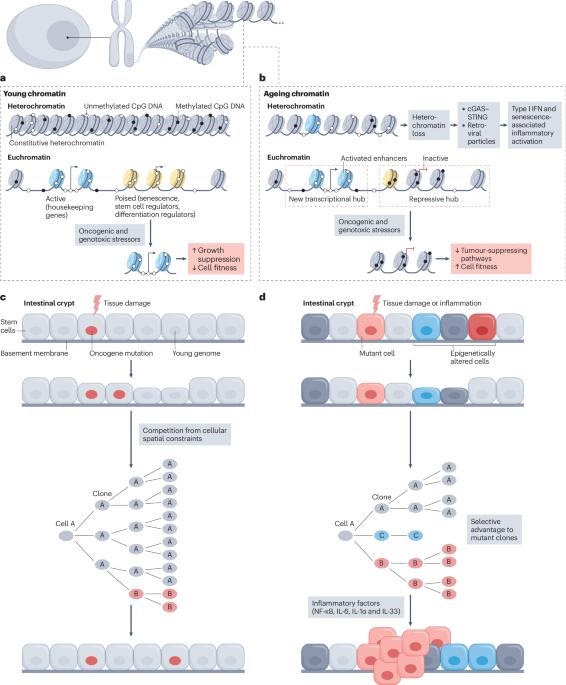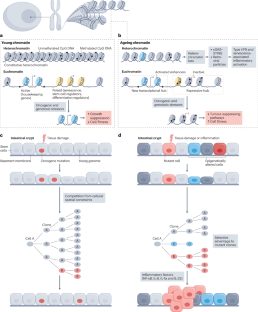揭示癌症中衰老肿瘤微环境的遗传学和表观遗传学
IF 66.8
1区 医学
Q1 ONCOLOGY
引用次数: 0
摘要
一些基因的体细胞突变,包括关键的致癌基因和肿瘤抑制基因,从生命早期就存在,并随着个体年龄的增长而积累,这表明癌症的可能性是存在的,并且在一生中都在增长。然而,在50-60岁之后,患癌症的风险急剧上升,这表明这些突变进行克隆扩增和驱动癌症发展的能力取决于衰老过程中表观基因组和微环境的渐进式变化。表观遗传变化,包括DNA甲基化和组蛋白修饰,可以驱动癌前细胞衰老的各种特征,包括衰老的诱导、衰老相关的分泌表型、基因组不稳定和核完整性的降低、代谢和炎症应激反应、干细胞功能和分化潜力,以及氧化还原平衡。这也可以改变组织微环境中正常的免疫细胞和基质细胞,从而累积增强癌症驱动突变的影响,最终促进老年人癌症的发生和进展。揭示这些机制将提供新的预防和治疗策略,以限制老年人癌症的负担和进展。本文章由计算机程序翻译,如有差异,请以英文原文为准。


Unravelling the genetics and epigenetics of the ageing tumour microenvironment in cancer
Somatic mutations in several genes, including key oncogenes and tumour suppressor genes, are present from early life and can accumulate as an individual ages, indicating that the potential for cancer is present and growing throughout life. However, the risk of developing cancer rises sharply after 50–60 years of age, suggesting that the ability of these mutations to undergo clonal expansion and drive cancer development is dependent on the progressive changes in the epigenome and microenvironment that occur during ageing. Epigenetic changes, including DNA methylation and histone modifications, can drive various hallmarks of ageing in precancerous cells, including induction of senescence, the senescence-associated secretory phenotype, genomic instability and reduction of nuclear integrity, metabolic and inflammatory stress responses, stem cell function and differentiation potential, and redox balance. This can also alter the normal immune and stromal cells in the tissue microenvironment, which cumulatively enhances the effects of cancer driver mutations, ultimately promoting cancer development and progression in aged individuals. Unravelling these mechanisms will provide novel preventive and therapeutic strategies to limit the burden and progression of cancer in aged individuals. In this Review, Easwaran and Weeraratna outline how ageing leads to epigenetic alterations in the tissue microenvironment, enhancing clonal expansion of mutations and ultimately increasing cancer risk.
求助全文
通过发布文献求助,成功后即可免费获取论文全文。
去求助
来源期刊

Nature Reviews Cancer
医学-肿瘤学
CiteScore
111.90
自引率
0.40%
发文量
97
审稿时长
6-12 weeks
期刊介绍:
Nature Reviews Cancer, a part of the Nature Reviews portfolio of journals, aims to be the premier source of reviews and commentaries for the scientific communities it serves. The correct abbreviation for abstracting and indexing purposes is Nat. Rev. Cancer. The international standard serial numbers (ISSN) for Nature Reviews Cancer are 1474-175X (print) and 1474-1768 (online). Unlike other journals, Nature Reviews Cancer does not have an external editorial board. Instead, all editorial decisions are made by a team of full-time professional editors who are PhD-level scientists. The journal publishes Research Highlights, Comments, Reviews, and Perspectives relevant to cancer researchers, ensuring that the articles reach the widest possible audience due to their broad scope.
 求助内容:
求助内容: 应助结果提醒方式:
应助结果提醒方式:


